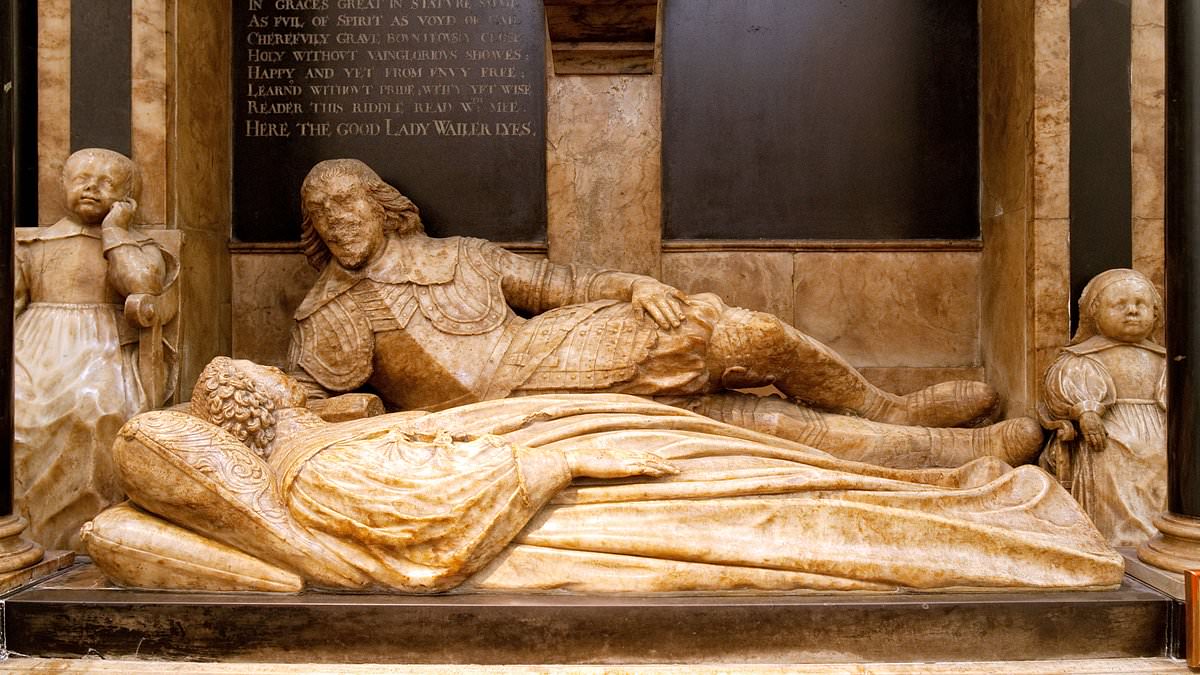QUESTION: Why have a number of statues in Bath Abbey been defaced with graffiti?
Bath Abbey wasn’t always free-standing. Following the Reformation, various houses and shops attached themselves to the church and remained there until the Abbey’s restoration in 1833.
For hundreds of years, the occupants habitually used the Abbey as a thoroughfare. Inscriptions, including Marian marks (double Vs signifying the phrase virgo virginum, virgin of virgins), can be found in the main body of the church.
The most striking examples can be found on the Lady Jane Waller monument. She married Sir William Waller and died in childbirth in 1633. The monument features her figure in repose with her husband gazing down on her.
Waller was a leading Parliamentary general during the First English Civil War (1642-46).
Royalist soldiers vented their feelings against him by battering the face of his effigy. The damage can be dated because Samuel Pepys recorded in his diary entry of June 14, 1668, that he saw Waller’s effigy ‘lying with his face broken’.
Q: Was the Citroen Axel a Romanian-designed car?
Linda Zou, Ware, Herts
Q: What were 18th-century ‘circuit riders’?
Mr P. L. Reece, Gerrards Cross, Bucks
Q: Did the real Toranaga have an English adviser equivalent to Shogun’s John Blackthorne?
Sylvia Davies,Hemel Hempstead, Herts
Angelina Watson, Bath, Somerset
QUESTION: Can the words ‘round’ and ‘around’ be used interchangeably?
‘Round’ is historically an adjective, in that it describes an object. A ball is round. ‘Around’ is an adverb, in that it qualifies how something is done, thus
you go around a corner. Therefore, in the strictest formal grammar, they are not interchangeable because they apply in different situations.
However, as has been so often observed, language continually evolves and ‘round’ is commonly applied as an adverb without misunderstanding.
Ken Wood, Newport, Gwent
QUESTION: Which hit songs took the least and longest time to write?
Further to the earlier answer, according to Bono, the last song on U2’s War LP had to be written rapidly because they were running out of studio time: ‘We wrote this song in about ten minutes, we recorded it in about ten minutes, we mixed it in about ten minutes and we played it, then, for another ten minutes, and that’s nothing to do with why it’s called 40.’ The reason it’s called 40 is because he took inspiration from Psalm 40 in the Bible.
Liam Brooks, Swansea
Is there a question to which you want to know the answer? Or do you know the answer to a question here? Write to: Charles Legge, Answers To Correspondents, Daily Mail, 9 Derry Street, London W8 5HY; or email [email protected]. A selection is published, but we’re unable to enter into individual correspondence
